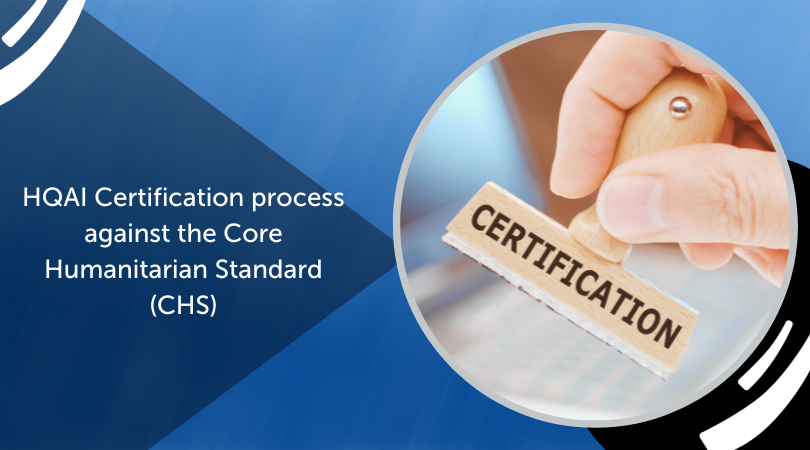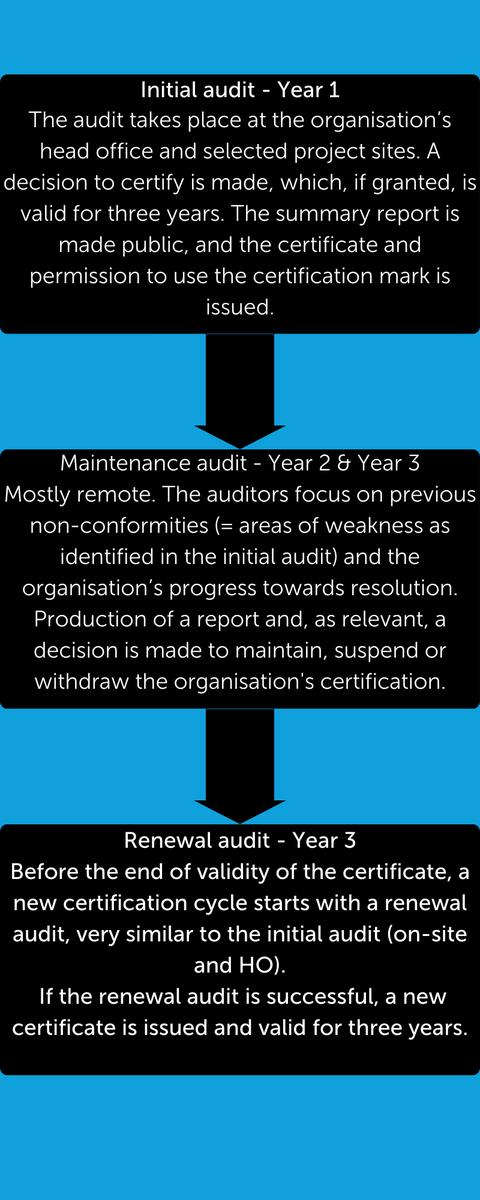HQAI Certification process against the CHS
HQAI Certification process against the CHS: The Key to Successful Humanitarian and Development Initiatives
January 2024

In the complex world of humanitarian and development work, it is essential to maintain quality, accountability, and transparency. Certification against the Core Humanitarian Standard (CHS) plays a crucial role in achieving this. The Humanitarian Quality Assurance Initiative (HQAI) offers an objective and independent certification process to ensure that organisations comply with the Nine commitments outlined in the CHS on Quality and Accountability. This certification process helps organisations to reflect on their practices and start a continuous learning process, enhancing their accountability, credibility, and transparency. By implementing robust internal quality control mechanisms, organisations can improve their aid delivery and achieve better quality.
« CHS verification is not a one-time achievement but a commitment to ongoing improvement. It encourages organisations like ours to assess and enhance their policies, processes and practices continuously. Being verified against the CHS also publicly validates our commitment to upholding the highest standards of humanitarian practice and accountability internally. Showing that we are working hard to meet this global mark continually increases the credibility and trust we get from donors, partners and, most importantly – the people we serve ». Abdullah Al Kaff, Partnership Officer at Building Foundation for Development, September 2023
Benefits
HQAI supports organisations in working towards principled and people-centred aid.
The benefits of certification are manifold, including:
- Demonstrating Compliance: Certified organisations can use the HQAI certification mark in their branding, building trust with stakeholders.
- Learning and Improving: Organisations undergo a continuous learning process, enhancing their accountability, credibility, and transparency.
- Enhancing Aid Quality: Certification improves aid quality, accountability, efficiency, and equitability, ultimately contributing to improving the lives of vulnerable and at-risk people and communities.
- Strengthening Organisational Systems: The audit process strengthens organisational systems, reinforcing technical and organisational capacities.
HQAI and The Certification Process
Among the independent audit services HQAI offers, certification is the most comprehensive one. It involves a rigorous assessment that results in a pass-or-fail decision. The certification is valid for a period of three years, during which regular audits are conducted on the organisation. To maintain the certification, the organisation must continue to conform to the standard. This is assessed in annual maintenance audits.
Organisations must address non-conformities within a given timeframe upon receiving the audit results. The entire organisation is involved in a learning process, continuously improving its systems and processes. This commitment to improvement is integral to the principles of auditing.
How it Works More Precisely
Our auditing methodology is adapted to the CHS and specificities of humanitarian and development work and organisations, similar to management system auditing in other sectors. The audits conducted by HQAI are customised and adjusted to suit the organisations being audited and the locations where they operate, all while maintaining a consistent and rigorous process. The objective of these audits is to determine if the organisation has a systematic approach to quality and accountability, resulting in good practices on the ground.
- Gather Evidence: HQAI auditors review documents, observe organisational practices, analyse information flow, and engage with staff and partners of the audited organisation. In addition, HQAI auditors directly consult communities affected by crises. Evidence is collected from the Head Office, selected country/regional, and project sites.
- Analyse Evidence: Evidence is analysed to review if governance structures, policies, procedures, internal quality management systems, and the culture of an organisation allow the application of the Core Humanitarian Standard.
- Help Organisations Improve: HQAI provides comprehensive feedback through a thorough report, working collaboratively with organisations over time. The summary report is made available to the public to read. The goal is continual improvement, building trust and better aid, and HQAI provides the necessary tools for organisations to enhance their quality and accountability. Ultimately, the entire process is intended to benefit the affected populations and communities that organisations work with.

Principles of Auditing
The audit process is guided by several principles that include ethical conduct, fair presentation, due professional care, independence, and an evidence-based approach. These principles make auditing an effective tool for supporting management policies and controls and provide actionable information for organisations to improve.
HQAI adheres to international auditing rules and applies these principles when engaging with all actors involved in quality and accountability. HQAI is accredited annually against ISO/IEC 17065:2012 to demonstrate their engagement.
« CHS Audits for us are special, as they look at us holistically, both in terms of the broad spectrum of the nine commitments, but also from different angles that include the voices of the people we serve. This makes every audit a very constructive and formative exercise in itself ; interviews and follow-up conversations with HQAI auditors are often also moments of reflection and ideas. For us, concluding an audit is, therefore, always somewhat of an inspiration: It confirms where we have moved forward while helping us understand where we should have more ambition in our journey to become the most accountable we can be as an organisation. This is not least due to the quality of the auditors we had over the years. » Volker Hüls, Head of Effectiveness, Knowledge and Learning at Danish Refugee Council (DRC), December 2023
Commitments
As a professional, non-profit, and non-governmental organisation, HQAI's commitment to international auditing standards contributes to the overall improvement of the sector, benefiting organisations, funders, and, most importantly, the vulnerable and at-risk populations they aim to serve. The continuous pursuit of quality and accountability is not just a certification; it's a commitment to positively impacting the world.
« HQAI establishes confidence between critical humanitarian partners. And that’s why I am so motivated by their mission and convinced by their impact. Independent, objective auditing is vital at a time when local actors deserve scaled resources from international donors to meet the multiple challenges of our times. » Yves Daccord, Renowned Humanitarian Leader, International Strategist, Influencer, and Former Member to HQAI’s Board and General Assembly, December 2023
Category